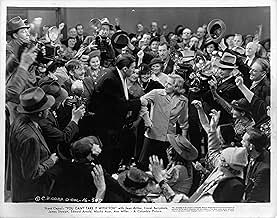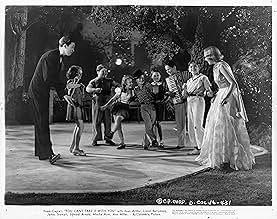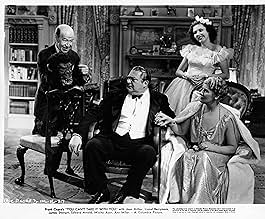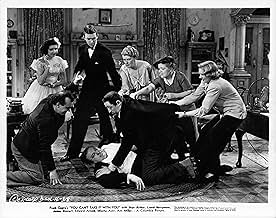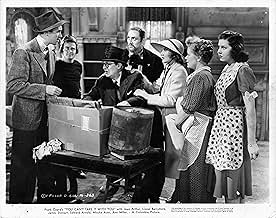अपनी भाषा में प्लॉट जोड़ेंThe son of a snobbish Wall Street banker becomes engaged to a woman from a good-natured but decidedly eccentric family not realizing that his father is trying to force her family from their ... सभी पढ़ेंThe son of a snobbish Wall Street banker becomes engaged to a woman from a good-natured but decidedly eccentric family not realizing that his father is trying to force her family from their home for a real estate development.The son of a snobbish Wall Street banker becomes engaged to a woman from a good-natured but decidedly eccentric family not realizing that his father is trying to force her family from their home for a real estate development.
- निर्देशक
- लेखक
- स्टार
- 2 ऑस्कर जीते
- 6 जीत और कुल 7 नामांकन
- Donald
- (as Eddie Anderson)
फ़ीचर्ड समीक्षाएं
Not to take away from today's movies, but for anyone who has not gone back and viewed classic Capra, such as "You Can't Take it With You," then they are truly missing out.
This movie is pure magic and beauty. Lionel Barrymore gives a performance as relevant in 2005 as it was in 1938. And what can you say about Jimmy Stewart?? This is a rare gem of a film and in true Capra fashion, the climactic final scene brings tear to the eye, much the same way as Harry Bailey's toast in "It's a Wonderful Life."
Stewart comes from a rich and completely uptight family. Miss Arthur is the only relatively sane member of a very wild family. Lionel Barrymore is wonderful as the grandfather here. He is so warm and funny in this movie, it's hard to believe he's the same man who played the evil Mr. Potter in It's A Wonderful Life. Edward Arnold who was known for playing slimy villians, is great as Stewart's very wealthy and totally stuck-up father.
Do any of Capra's works actually speak 'that' one particular message? Perhaps the closest to the above is "It Happened One Night". "Lost Horizon" is about rediscovery and peace of mind. "Mr Smith" is politically and small town oriented and "Mr Deeds" deals with the same except without some political yawn. George Bailey should have had a better dosage of the "You Can't Take it With You" policy in "It's a Wonderful Life".
Here is a play that exercises Frank Capra's famous adage with all humour already built in. Why shouldn't it work?
The stage version was a phenomenal success, written superbly by George S. Kaufman and Moss Hart. If their story is slightly lacking, look no further than the delightful cast of characters. Mr Poppins, toy and mask maker. Alice's Father who meddles with fireworks. Essie the ballerina, Penny the playwright and the wonderful Russian ballet teacher. The uptight Kirby banking corporation. Then there's the "Mr Smith" duo, Tony (Jimmy Stewart) and Alice (Jean Arthur).
The stand out performer here, is naturally the lovable Lionel Barrymore as Grandpa Vanderfhoff. Although the first film in which the damaging effects of his arthritis began to show, Capra had his leg put in a cast and had him move around on crutches. He relishes his performance.
I have heard of complaints which discuss the fact this film fails to address corruption and greed in a similar manner to "Mr. Smith Goes to Washington" which successfully played its part going against the American capital. Once again, Capra emphasises his favourite theme of the little guy up against the world and succeeds, but "You Can't Take it With You" basically does not even make a mild attempt to criticise the American system of government, past or present, even though I know very little about it.
On different levels, look at this film in the light of discussing heavier issues, as the aforementioned greed and corruption. I just don't think Mr Capra would have liked it as much for one of his works to be remembered like that, especially with the basic message staring at us right in the face.
Nevertheless, it is another of Capra's life saving feel good movies. All it is encouraging us to do is to have a little fun.
Rating: 8/10
Too often type-cast as a plutocrat, Arnold nevertheless demonstrates nuance and sensitivity as a man who, despite many flaws and faults, is redeemed by his love for his son. Arnold is seldom credited with the subtlety and poignancy of his characterizations, probably because he generally played greedy capitalists in a time when greedy capitalists were even more frightening than they are (and properly so) now, but this is an omission that should be corrected. His characterization in this comedy is a powerful performance, and grossly under-appreciated. He was one of the masters of American cinematic acting, with never a false note on his performances, and it is shameful that he is not so acknowledged.
Barrymore is in the role of the good guy, the one who's figured out that material things are less important than having friends and enjoying life. He also understands that you've got to let people be free to explore themselves, and be who they are. He has a charming scene early on with Arthur, listening to her describe her new love, and reminiscing about his deceased wife. He's also the voice of reason about extremism in the world, commenting that everybody was running out to 'get an ism' to solve their problems, e.g. communism or fascism, as opposed to sticking to the principles of America. "With malice toward none and charity to all," he quotes Lincoln, "Nowadays they say think the way I do or I'll bomb the daylights out of you." It's a wonderful character, and well played by Barrymore.
Jimmy Stewart and Jean Arthur are endearing in their roles as well, and they also turn in very good performances. Watch Arthur's small facial reactions in the aforementioned scene with Barrymore, and later when she's with Stewart when he's clowning around in the restaurant and threatening to scream. The idea that the innovation Stewart's character wants to pursue harvesting energy from the sun's rays like plants really made me smile, seeing as this type of green energy sounded so crazy in 1938. The film isn't bullish on the idea per se, but it gets across the point that it's better to have the courage to follow one's dreams, than it is to bury them in a hum-drum existence.
There is a joy to the film in this house that Barrymore runs, with inventors in the basement letting off firecrackers, Jean Arthur sliding down the bannister, and her sister (Ann Miller) twirling around to her ballet instructor's direction. On the night Stewart decides to drop in on them as a surprise so that his family can see Arthur's in a true light, Miller is dancing about, Barrymore is tossing darts, his daughter (Spring Byington) is working on an awful old painting of hers with one of the guys posing as a Roman discus thrower, and the servants are dancing delightfully in the kitchen. Everyone is simply being themselves. No one cares how good they are, or exactly how they'll monetize what they're doing. They simply do what they want to do, and have fun at it, letting the money sort itself out in some mysterious way that isn't immediately apparent to us.
A lot is made of director Frank Capra's idealism, which may seem naïve to the modern viewer. It's true that this is movie of hope and optimism, but at the same time, Capra was clear-eyed about what was happening in the world. When Barrymore asks the Russian ballet teacher (Mischa Auer) "Did you bring me any Russian stamps?," the latter replies "No, nobody writes to me, they're all dead," which considering Stalin's purges in 1937-38 is a chilling comment slipped in to the script. Capra also recognized the danger of a climate of fear, and through Arthur's character (actually quoting Barrymore's), says that he has a special aversion to those "the people who commercialize on fear, to sell you something you don't need." He's also spot on when it comes to satirizing the ultra-wealthy, and pointing out how unfair the world is when the wealth gap is so large. Edward Arnold's character buys influence in Washington and has a squadron of lawyers and yes-men to help him push his weight around. On the personal side he turns up his nose at the idea of eating humble fare, and his wife (Mary Forbes) haughtily looks down on everyone. As he's about to explain to a bunch of guys in jail how unemployment is "an emotional problem", he tosses a cigar away and a horde of them go after it, which is such a perfect metaphor. Capra was a beacon in the darkness, and with his ability to deliver such stirring social messages in delightful movies - making them work on both levels - he should be considered a genius.
On the other hand, it's interesting that Barrymore's character has such a casual attitude about money, I mean, one does need to be able to eat. It's a little disturbing that when an IRS agent calls on him, he admits that he's never paid income tax because he "doesn't believe in it." He then goes on to ask where all those dollars go, ridiculing the idea that America needs battleships since they haven't been used since the Spanish-American War (hmmm not so prescient in that comment), and not seeing the irony in the fact that his own servants are "on relief." He'll later say that he was just joking about all this, that he doesn't owe the government a dime, but I just thought this smacked of such backwardness, and counter to all of the programs FDR started that were helping Americans. Later we find out that he was once an executive himself, until one day "it struck me that I wasn't having any fun." I admire the sentiment to prioritize life over amassing a fortune since, after all, you can't take it with you, but it seems a little tone deaf to not recognize the need for some amount of wealth to have this luxury.
There are lots of parallels to 'It's a Wonderful Life', including the rich industrialist who has lost his sense of values and is poor in the more important ways in life, the 'little guy' who resists his plans for a monopoly by not selling out to him, and a spontaneous cash collection from friends when one is in trouble. In addition the obvious actors in both films, you'll also find Papa Bailey (Samuel S. Hinds) here, as well as the same raven (Jimmy the raven), who apparently had quite the filmography and collaboration with Capra. In this case Stewart is the scion of the industrialist, not the little guy, and he ultimately quits his dad's company to pursue his own dream, as opposed to finding himself forced to stick around at the ol' Building and Loan. The biggest difference, however is that this film imagines that rich men have souls, and that there is a place deep within that can be reached through friendly overtures and some harmonica music. Perhaps recognizing this was idealistic even by his own standards, it's notable that eight years later, that wasn't the case with Mr. Potter, who was never reached.
Oscars Best Picture Winners, Ranked
Oscars Best Picture Winners, Ranked
क्या आपको पता है
- ट्रिवियाAnn Miller was only 15 years old when this movie was filmed. Her character is called on to perform numerous (amateur) ballet positions, including dancing en pointe. She had never been trained to do so, and wasn't using shoes with the proper support. She was just forcing her feet up onto their toes, which was very painful for her. She hid this from the cast and crew, but would cry (out of sight) off stage. James Stewart noticed her crying, though he didn't know why, and would have boxes of candy to make her feel better.
- गूफ़When Alice is in the courtroom, she is wearing a trench coat as newspaper photographers take pictures. In the newspaper pictures, she is not wearing the coat.
- भाव
Grandpa Martin Vanderhof: Lincoln said, "With malice toward none, with charity to all." Nowadays they say, "Think the way I do or I'll bomb the daylights outta you."
- कनेक्शनEdited into The Three Stooges Meet Hercules (1962)
- साउंडट्रैकValse Brilliante Op. 34 No 2
(1838) (uncredited)
Music by Frédéric Chopin
Played on an xylophone by Dub Taylor
टॉप पसंद
- How long is You Can't Take It with You?Alexa द्वारा संचालित
विवरण
- रिलीज़ की तारीख़
- कंट्री ऑफ़ ओरिजिन
- भाषाएं
- इस रूप में भी जाना जाता है
- Vive como quieras
- फ़िल्माने की जगहें
- उत्पादन कंपनी
- IMDbPro पर और कंपनी क्रेडिट देखें
बॉक्स ऑफ़िस
- बजट
- $16,44,736(अनुमानित)
- चलने की अवधि2 घंटे 6 मिनट
- रंग
- पक्ष अनुपात
- 1.37 : 1
इस पेज में योगदान दें



